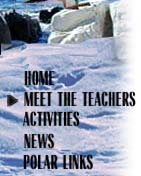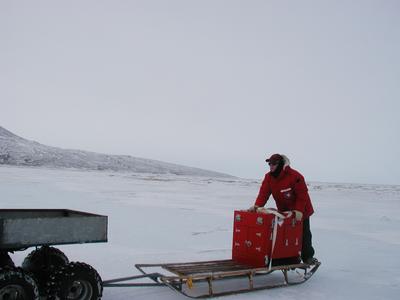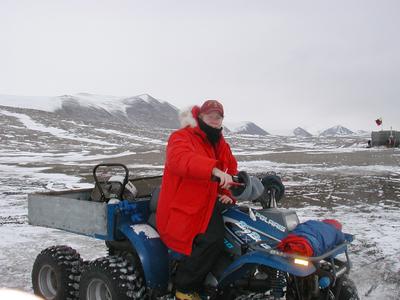
|
|
14 November, 2001
Tim Brox, an Eagle Scout experiencing Antarctica, spent several days
visiting our field camp at Explorers Cove.
The wind was strong again throughout the day, but Dr. Bowser, Dr. Pollock,
Dr. Korsun, and Phil Forte set out to Marble Point to scuba dive under the
ice. Dr. Korsun stayed on the surface to assist the dives. It was a cold,
windy day, so I was thankful to have this time to write journal entries
and to work on the upcoming audio broadcast with my students and the
outside world, which hopefully will take place at 4 a.m. tomorrow morning.
I also took the opportunity to interview Tim Brox, the Eagle Scout, who
flew to Explorers Cove with me this past Thursday, November 8th. Tim has
been a welcome addition to the field camp. He is a self-starter, meaning
that he steps in to do whatever needs to be done without being told. With
each day, it only confirms why this teenager was selected by the Boy
Scouts of America to experience Antarctica. Without a doubt, Antarctica
will make a mark on his life.
And the story begins: Tim Brox is an 18 year old from Fresno, California.
On April 23, 2001, he learned that life as he knew it was about to change.
He is "the" Eagle Scout who has been selected to come to Antarctica this
year. What an honor and an opportunity of a lifetime! Initially, his goal
was to parcticipate in research relating to biology and to see the
continent. Three weeks into this Antarctic experience, he already feels
the changes taking place within his life. He doesn't know where this will
lead, but he knows that his life is being moved forward. Antarctica builds
strength and endurance by daily life on this harsh, but beautiful
continent.
Before deployment to Antarctica, Tim spoke several times with Guy
Guthridge, program manager for the National Science Foundation's Office of
Polar Programs. Tim also had discussions with a "point of contact" for
Raytheon Polar Services (the logistic people for Antarctica). From these
discussions, he arranged tentative plans, which included going first to
the U.S. McMurdo Research Station in Antarctica, via New Zealand. He knew
he would go to field camps, visit the South Pole, go back to New Zealand,
go to South America, and then go by ship to the U.S. Palmer Research
Station on the Antarctic Peninsula. Few people get the opportunity to go
to all three U.S. Research stations and outlying field camps.
Tim spent the first two weeks in McMurdo. He took sea ice and helicopter
safety training, snow survival school, as well as training to get a
driver's license to operate the heavy vehicles, such as sprytes, and fleet
vehicles to drive trucks and vans in Antarctica. He also worked at the
Berg Field Center (BFC), which supplies things such as tents, coffee
makers, pots, and survival gear to individuals and groups as needed. His
main job there was to check out and repair tents. He also found it helpful
to work with the MEC (Mechanical Equipment Center) because working on
small equipment such as chain saws, generators, and snowmobiles would be a
great aid in the field, especially since he would be going to several
field camps. While here at Explorers Cove, Tim opted to sleep in his tent
rather than the comforts of the Jamesway hut. This gave him the
opportunity to experience the "real" Antarctica and to learn more about
his survival gear.
Tim was scheduled to leave for Lake Hoare today, but as typical &Antarctica
said "no". He is now scheduled to leave tomorrow morning. He's not sure yet
sure what he will be doing or how long he will be staying in this field
camp, but after meeting Tim, I am certain that he will adjust and grow
from each new experience. Facing these unknowns will build confidence and
change Tim more than Antarctica itself. Antarctica is the force that
pushes a person to change, but its up to the person to gain from the
experience. Tim will benefit because he has the courage to change. In
doing so, he will grow tremendously.
Tim's schedule after Explorers Cove: He will go to the Dry Valleys to work
on a stream project, then a sea ice study at Cape Evans to learn more
about the impact of ice melting. He will then go on to the Big Razorback
Island >from November 25 through December 12th, to work with Weddell
seals. On December 17th - 21st, Tim will be at the South Pole. From
December 31st to January 5th, he is scheduled to do a study of Orca
"killer" whales while on the United States Coast Guard Icebreaker. Tim
will not only study science, but also learn history with his next scheduled
project from January 8th - 10th. This project involves studying microbes
in the wood at the Scott Hut, and determining the best way to preserve the
hut from these microbes. Tim will leave McMurdo on January 16th and spend
some time in New Zealand before departing for South America. He should
arrive in Punta Arenas on February 4th in time to begin travel by ship on
February 5th to head across the Drake Passage to the Palmer Research
station on the peninsula of Antarctica. The Drake Passage has been known
to be one of the roughest crossings, frequently with 30 foot high waves.
Tim will stay at Palmer until March 2nd. He will arrive back in Punta
Arenas on March 6 , 2002. He would like to see Patagonia before heading
back home. Antarctica may change some of Tim's plans, but the changes will
be part of the adventure, growth, and learning.
From your friends at Explorers Cove, we wish you the best, Tim!

Tim was a great help at the field camp. He was involved with learning as much as he could while he was here. He sorted forams, helped assist in tending the dives, and helped drill the hole for the hydrology site. In this picture, he is helping bring the generator to the drill site by an ATV and sled. His mom would be proud to know that he even took his turn at cooking.

Tim!
Contact the TEA in the field at
.
If you cannot connect through your browser, copy the
TEA's e-mail address in the "To:" line of
your favorite e-mail package.
|
